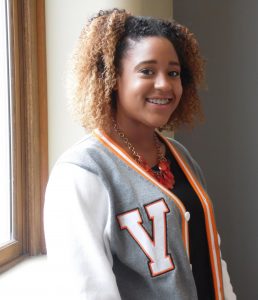Iowa State’s chapter of the National Society of Black Engineers allows students to contribute to the mission “to increase the number of culturally responsible Black Engineers who excel academically, succeed professionally and positively impact the community.” And Iowa State NSBE members are taking that mission to new levels.
NSBE is one of the largest student-governed organizations in the country, consisting of 394 chapters, pre-collegiate, collegiate and professional, and over 30,000 members. NSBE aims to promote the development and retention of all students in STEM related fields, particularly those who are underrepresented.
“Your own success isn’t really a success if you’re not helping other people get to where you are, as well,” said Jocelyn Jackson, graduate student in mechanical engineering, and chair of NSBE’s Region V that includes 53 universities in the central United States.
Iowa State’s chapter accounts for about 100 student members.
“Over the past several years, Iowa State has seen a consistent representation at the national and regional levels for this international professional organization,” said LeQuetia Ancar, assistant director of engineering student services, multicultural liaison and Iowa State chapter advisor for the past 10 years.
Five Iowa State NSBE members serve in Region V and national leadership positions – and we’ll be featuring one NSBE leader each week in February.
Become a CEO: Jocelyn Jackson

For Jackson NSBE has become more than just a club.
“I definitely would not have made it in engineering without NSBE,” Jackson said.
As the representative at the national level for over 3,500 constituents in Region V, Jackson sets goals and directives at the regional and chapter levels in order to help the organization remain successful.
Jackson’s position allows her to take ownership of a budget of over $120,000 to push the NSBE mission.
“It’s like we’ve already had the equivalent leadership as a manager of a company, and we’re allowed to make mistakes and learn from them,” Jackson said.
Because NSBE is a student-run organization, the students are “the CEOs” of the organization, according to Jackson. Professional staff are hired for day-to-day operations, but students are the ones who call the shots.
The society’s current vision, NSBE 2025, has a goal to graduate 10,000 black engineers annually by the year 2025 in Region V. The nation is currently at a bit over 3,000 per year, according to Jackson.
In order to achieve NSBE 2025, the organization offers STEM promotion and education programs, including NSBE Day at NASA in Houston, Texas and educational visits to middle schools and high schools across the region.
The ISU chapter also currently coordinates a program called “Engineering the Future” at the local Ames Middle School.
When Jackson discovered NSBE when she first came to campus, she jumped at the opportunity to get involved. NSBE provided her with the family and home feeling that she’d been missing.
Jackson decided to run for a position to fundraise for the chapter, and did so well that she continued for another semester. Jackson then became a regional board member, so she could better help affect positive change in the organization.
Jackson urges other students to get involved in NSBE by becoming a chapter member, then advancing as far as they’d like to in NSBE leadership from chapter officers to national executive board members.
With support from, not only chapter members, but over 12,000 members at the national conventions, NSBE could become like home.
“NSBE is not only going to get you to where you need to be, but they’ll love you while they do it,” Jackson said.
For more information about NSBE, visit nsbe.org or attend a general assembly meeting, held every other Thursday evening in Marston Hall. There are no membership restrictions for NSBE, and any member can run for a chapter officer position, which take place at the end of the spring semester each year.
